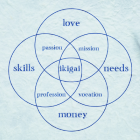How to Find Your Ikigai
In today’s fast-paced world, many of us strive to find a sense of purpose and meaning in life. One of the most powerful concepts that can help guide you on this journey is Ikigai—a Japanese term that translates to “reason for being.” It embodies the idea of living a life filled with purpose, happiness, and fulfillment. In this article, we’ll explore how to find your Ikigai, helping you align your passion, mission, profession, and vocation.
What is Ikigai?
The word Ikigai comes from two Japanese words: iki (life) and gai (value or worth). It reflects a comprehensive approach to life, where your work, hobbies, passions, and social connections intersect. Finding your Ikigai means identifying the sweet spot between:
- What you love
- What you are good at
- What the world needs
- What you can be paid for
Steps to Find Your Ikigai
1. Self-Reflection: What Do You Love?
The first step to finding your Ikigai is to deeply reflect on what you truly enjoy. Consider these questions:
- What activities make you feel alive?
- What hobbies or pastimes do you get lost in?
- What subjects excite you to learn more about?
Jot down everything that comes to mind without filtering your thoughts. It could be art, writing, technology, or even helping others. This will form the foundation of your Ikigai.
2. Identify Your Strengths: What Are You Good At?
Ikigai is also about leveraging your natural talents and strengths. Take some time to think about:
- What skills have you mastered?
- What do others often compliment you on?
- What tasks or activities come easily to you?
Recognizing your strengths allows you to match your abilities with what you love doing, bringing you closer to your Ikigai.
3. Contribution: What Does the World Need?
Your Ikigai isn’t just about personal satisfaction—it’s about how you can contribute to the world. Reflect on:
- What societal issues do you care about?
- How can you make a positive difference in others’ lives?
- What impact do you want to leave on the world?
When your purpose connects with helping others or solving problems, you align with a deeper sense of fulfillment.
4. Monetization: What Can You Be Paid For?
A critical element of Ikigai is financial sustainability. You can pursue your passions and help others, but you also need to earn a living. Consider:
- What services or products can you offer that align with your passion?
- Are there existing industries or job roles that pay for the skills you have?
- Can you turn your hobbies or interests into a profitable career?
Finding this balance ensures that your Ikigai is practical and sustainable in the long term.
Integrating Your Ikigai
After identifying what you love, your strengths, what the world needs, and what you can be paid for, it’s time to look at where these elements overlap. Your Ikigai lies at the intersection of these four areas. To integrate your Ikigai into daily life:
- Pursue work that fulfills your passions and strengths.
- Continuously learn and grow in areas that excite you.
- Seek opportunities to give back to society or address unmet needs.
- Ensure that your career provides financial stability.
Overcoming Challenges in Finding Ikigai
Sometimes, finding your Ikigai can feel overwhelming or elusive. Here are a few tips to overcome challenges:
- Take your time: Ikigai is not something you find overnight. Allow yourself the space to explore and grow.
- Experiment: Try different paths—volunteer, freelance, or take up new hobbies.
- Seek feedback: Talk to friends, family, or mentors for insights into your strengths and how you can contribute to the world.
Conclusion
Finding your Ikigai is a journey that involves self-discovery, growth, and alignment with a purpose beyond yourself. By exploring what you love, identifying your strengths, considering the needs of the world, and ensuring financial sustainability, you can unlock a fulfilling and meaningful life. Take the first step today to find your Ikigai and live with purpose.
Read More:
5 Best-Selling Novels of All Time
15 Beautiful Quotes from Classic Books
10 Reasons You Should Read Dostoevsky’s Crime and Punishment

